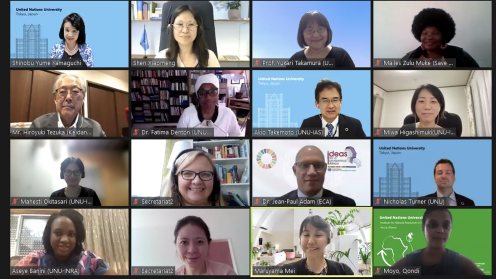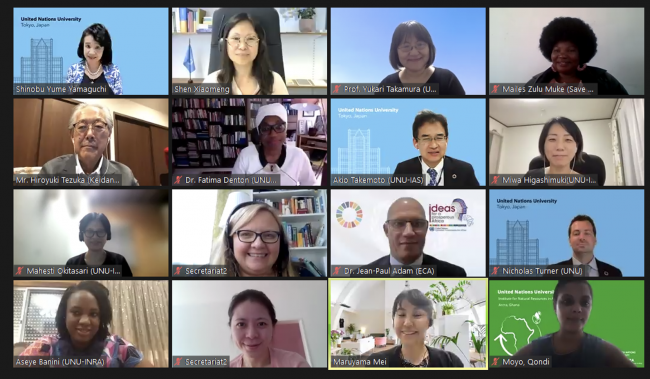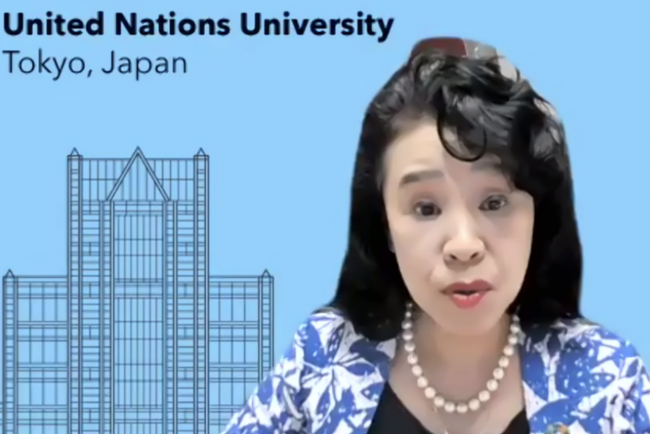This event identified key requirements for achieving carbon neutrality and a just transformation, including ensuring universal access to energy and clean cooking, engaging with all stakeholders, including local communities, adopting nature-based solutions, and greening supply chains. Participants also identified opportunities for an African green transition, in agriculture, trade, technology and cities, as well as barriers, such as the high cost of finance.
The side event took place on Tuesday, 6 July 2021, on the sidelines of the High-level Political Forum on Sustainable Development 2021. It was organized by the UN University Institute for the Advanced Study of Sustainability (UNU-IAS), UNU Institute for Natural Resources in Africa (UNU-INRA), UNU Institute for Environment and Human Security (UNU-EHS), UN Department of Social and Economic Affairs (UN DESA), UN Economic Commission for Africa (UN ECA), the African Union Commission (AUC), and UN Framework Convention on Climate Change (UNFCCC) Secretariat.
In her opening remarks, Shinobu Yume Yamaguchi, Director, UNU-IAS, highlighted that to achieve the Sustainable Development Goals (SDGs) and address climate change, what is required is the transformation of society and key economic sectors such as energy, transportation, urban infrastructure, and food production, through massive investment and innovation by the public and private sectors. She said the transition to a carbon-neutral world must be fair and inclusive, creating new and better jobs for a sustainable future.
Hiroyoshi Sasagawa, State Minister of the Environment, Japan, speaking via video message, highlighted that the Ministry is implementing a pilot programme to evaluate the non-environmental additional value of Japan’s policies, such as infectious disease control, employment growth, and economic growth, taking all SDG targets into consideration. He said his ministry will work with UNU to disseminate a new evaluation methodology for the SDGs to the world, based on this pilot programme.
Yukari Takamura, Professor, Institute for Future Initiatives, University of Tokyo, Japan, noted momentum towards achieving carbon neutrality by 2050 globally, stating that: business is taking the lead with many companies committing to net zero not only in their direct emissions but also in the supply chains; and financial institutions and investors are also changing their behavior towards achieving this goal. She highlighted the need for:
- appropriate policies and measures for transforming the industrial structure;
- a clear long-term vision for achieving decarbonization and sustainable development; and
- strategic planning towards a just transformation.
The subsequent panel discussion was moderated by Xiaomeng Shen, UNU Vice-Rector in Europe and Director, UNU-EHS. Panelists responded to two key questions: how is equity in the context of transformation interpreted and understood by different stakeholders; and what are the preconditions for a just transformation?
Minoru Takada, Team Leader, Sustainable Energy, UN DESA, said efforts towards a just transition must include achieving universal access to energy and to clean cooking. He called for explicit targets and indicators aligned with the SDGs. He said any strategy for achieving a just transition must focus on achieving all 17 SDGs. He stressed where trade-offs are involved, countermeasures to address the trade-offs must be in place.
Youssef Nassef, Director, Adaptation Division, UNFCCC Secretariat, said trade-offs and spillovers must be carefully considered and planned so efforts to achieve a just transition do not exacerbate climate change or reduce climate resilience. He also highlighted the need for: inclusive stakeholder engagement; indigenous values of connectivity, collectiveness, and inter-generational equity; and nature stewardship.
Fatima Denton, Director, UNU-INRA, said Africa’s green transition must be home-grown and endogenous owned. She said economic diversification is essential for Africa’s long-term development, but that it will involve short-term costs and trade-offs. She identified transition opportunities, including trade, technology, cities, and agricultural transformation, noting agriculture is a gateway to green industrialization, which would lead to greening supply chains and enabling the continent to increase its productive capacity and competitiveness.
Jean-Paul Adam, Director for Technology, Climate Change and Natural Resources Management, UN ECA, said Africa was not on track to achieving the SDGs even before the COVID-19 pandemic. He called for: investing in green sectors, particularly in energy and climate-smart agriculture; and adopting nature-based solutions to actively rehabilitate nature and create livelihoods linked to the natural environment. He identified the high cost of finance as a barrier and called for financing linked to investment in green sectors.
Hiroyuki Tezuka, Chair, Working Group on Global Environment Strategy, Committee on Environment and Safety, Keidanren, said energy conservation and decarbonization are essential for linking climate actions to green growth. He outlined the Keidanren Carbon Neutrality Action Plan, explaining that it contributes to long-term global warming countermeasures through efforts based on four pillars: emission reductions from domestic business operations; strengthening cooperation with other interested groups; promoting contribution at the international level; and developing innovative technologies toward carbon neutrality by 2050.
Mailes Zulu Muke, CEO, Save Environment and People Agency, Zambia, said local communities are being left out of efforts to address climate change. She noted, for instance, that communities cannot access resources for implementing projects on the ground because of onerous application requirements. She added that they also do not receive any feedback from research conducted in these communities, or benefit from solutions developed as a result, calling for greater engagement with local communities.
Closing the event, Yamaguchi called for solution-oriented research that will inform policymaking and help ensure a sustainable future for all.











